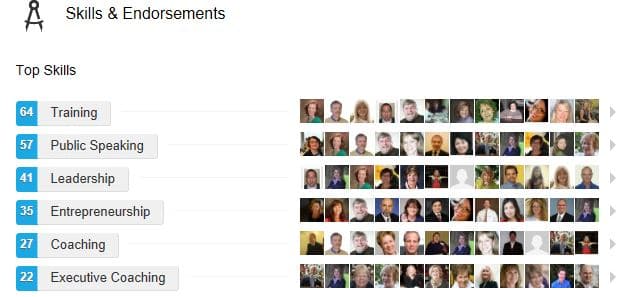LinkedIn Endorsements: Love them or hate them
Are you getting inundated with LinkedIn endorsements for skills you didn’t realize you had? Or perhaps you’ve received endorsements from people who have never worked with you, seen you speak or hired you. The whole LinkedIn endorsements thing has many people scratching their heads.
 I gave a social media and email etiquette presentation to a group of tax attorneys and CPAs and when I mentioned you should always thank people for LinkedIn recommendations they thought I was talking about endorsements. They expressed concern that I would suggest thanking people for clicking on a skill LinkedIn states you have. I’ll address thank yous in a bit. First let me explain endorsements.
I gave a social media and email etiquette presentation to a group of tax attorneys and CPAs and when I mentioned you should always thank people for LinkedIn recommendations they thought I was talking about endorsements. They expressed concern that I would suggest thanking people for clicking on a skill LinkedIn states you have. I’ll address thank yous in a bit. First let me explain endorsements.
Endorsements are not recommendations. People are not writing a paragraph or two about why they think you are good at your job. LinkedIn endorsements come from LinkedIn based on the skills you list on your profile. LI posts those skills at the top of your profile and show up when people visit your profile as well as when they go to the home page. The positive thing about endorsements is they give credibility for your skills and help strengthen your brand. They also allow you to recognize your connections for skills you know they have.
The annoying aspect about endorsements is LinkedIn suggests skills that either you don’t want posted on your profile or that aren’t skills you possess. But, you can control which ones are posted on your profile, and I would suggest you do so that people can see what skills you want to be known for. To hide skills you’d rather not show up on your profile read the instructions on LinkedIn.
I was getting endorsements for skills I have from past jobs but that I don’t want to be known for today. While my background is in marketing and it’s been very useful in growing my business, I want people to endorse me for my training, speaking, coaching and etiquette skills because that’s what people hire me for today.
If you’d like to opt out of endorsements altogether so that people can’t endorse you and you don’t get endorsement prompts for your connections read the instructions here.
Let me address when and why you should thank people for either endorsements or recommendations. You don’t need to thank people for endorsements, but you can. I usually thank people who I’d like to say hello to. Not that I don’t want to say hello to everyone, but because there is only so much time in a day, I focus on thanking just those folks I want to touch base with.
However, if someone takes the time to write you a recommendation you must thank them. It takes time and effort to write a recommendation, so you owe them a thank you for doing so. You don’t need to write them a recommendation in return, even though LinkedIn gives you that option. You can if you truly want to recommend their work. But, do write a thank you email, LinkedIn message or even better a handwritten thank you note.
I hope that clears up the confusion about endorsements vs. recommendations. How do you feel about LinkedIn endorsements? Do you like being endorsed or are they annoyances? Do you endorse others?
Please note: We have a new method of delivering blog posts to your inbox. If you have previously received these blog posts through Feedburner, please subscribe to receive these blog posts through the form below and unsubscribe to the posts you receive through Feedburner.
2 responses to “LinkedIn Endorsements: Love them or hate them”
-
I don’t care for the endorsement system as it stands because of the very reasons you cite: anyone can endorse you for anything, even if they’ve never worked with you. I will deselect certain areas of “expertise” because, as you say, I don’t want to be contracted for them. I will give endorsements, but only to people whose skills I have direct, first-hand knowledge of. If that’s they way we treated the option, the endorsement feature would have more credibility.
It’s a nice feature, and I appreciate it as a quick way to give someone I know and trust a thumbs-up without a full recommendation. But it needs some adjustments before it has any true meaning.I see the inappropriate endorsements as well-intentioned but a mild nuisance (simply because I feel I have to manage it, and because it has questionable credibility). What confounds me is when someone asks me for a formal recommendation, and I don’t even know the person, let alone worked with him/her!
Thanks for writing about this, Arden. I hope LinkedIn is watching posts like yours and working on a better solution.
-
BethBuelow I agree, the LI endorsement system is really meaningless in its current manifestation. Let’s hope LinkedIn does make some changes.

 Sign up for the award-winning Clise Etiquette newsletter and receive a free chapter of Arden's book Spinach in Your Boss's Teeth.
Sign up for the award-winning Clise Etiquette newsletter and receive a free chapter of Arden's book Spinach in Your Boss's Teeth.
Leave a Comment